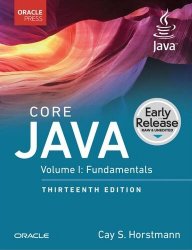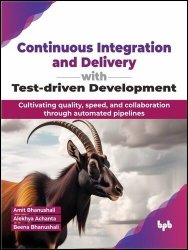 Foundations of Computer Vision (2024)
Foundations of Computer Vision (2024)
 Причина времени: Жизнь - дление - необратимость
Причина времени: Жизнь - дление - необратимость
 Лекарственные грибы: Большая энциклопедия
Лекарственные грибы: Большая энциклопедия
 Cloud Automation with Python: for Engineers
Cloud Automation with Python: for Engineers
 Рабочая тетрадь «Мои схемы»
Рабочая тетрадь «Мои схемы»
 Плоская резьба по дереву
Плоская резьба по дереву
 Illusio. Всемирная история заблуждений и обманов
Illusio. Всемирная история заблуждений и обманов
 Донские казаки в борьбе с большевиками. 1917-1919
Донские казаки в борьбе с большевиками. 1917-1919
 Machine Learning Techniques and Industry Applications
Machine Learning Techniques and Industry Applications
 Культура и ценность. О достоверности (2024)
Культура и ценность. О достоверности (2024)
 The Military Weapons Encyclopedia (US Military Encyclopedias)
The Military Weapons Encyclopedia (US Military Encyclopedias)
 Домашняя программа восстановления микрофлоры кишечника
Домашняя программа восстановления микрофлоры кишечника
 Сборник по мультиварке
Сборник по мультиварке
 Core Java, Volume I: Fundamentals, 13th Edition (Early Release)
Core Java, Volume I: Fundamentals, 13th Edition (Early Release)
 Continuous Integration and Delivery with Test-driven Development
Continuous Integration and Delivery with Test-driven Development
 100 Mistakes in Software Engineering
100 Mistakes in Software Engineering
 Foundations of Computer Vision (2024)
Foundations of Computer Vision (2024)
 Причина времени: Жизнь - дление - необратимость
Причина времени: Жизнь - дление - необратимость
 Лекарственные грибы: Большая энциклопедия
Лекарственные грибы: Большая энциклопедия
 Cloud Automation with Python: for Engineers
Cloud Automation with Python: for Engineers
 Рабочая тетрадь «Мои схемы»
Рабочая тетрадь «Мои схемы»
 Плоская резьба по дереву
Плоская резьба по дереву
 Illusio. Всемирная история заблуждений и обманов
Illusio. Всемирная история заблуждений и обманов
 Донские казаки в борьбе с большевиками. 1917-1919
Донские казаки в борьбе с большевиками. 1917-1919
 Machine Learning Techniques and Industry Applications
Machine Learning Techniques and Industry Applications
 Культура и ценность. О достоверности (2024)
Культура и ценность. О достоверности (2024)
 The Military Weapons Encyclopedia (US Military Encyclopedias)
The Military Weapons Encyclopedia (US Military Encyclopedias)
 Домашняя программа восстановления микрофлоры кишечника
Домашняя программа восстановления микрофлоры кишечника
 Сборник по мультиварке
Сборник по мультиварке
 Core Java, Volume I: Fundamentals, 13th Edition (Early Release)
Core Java, Volume I: Fundamentals, 13th Edition (Early Release)
 Continuous Integration and Delivery with Test-driven Development
Continuous Integration and Delivery with Test-driven Development
 100 Mistakes in Software Engineering
100 Mistakes in Software Engineering

Название: Лучшие способы добычи сусликов
Автор: Замахаев К., Воробьев Г. (сост.)
Издательство: Экономика
Год издания: 1971
Количество страниц: 20
Язык: русский
Формат: PDF
Размер: 19,01 Мб
В брошюре дано описание новейших капканов и приёмов для охоты на сусликов, а также даны рекомендации по первичной обработке их шкурок.
 Название: Основы основ чёрной магии. Практическое колдовство. Том 6
Название: Основы основ чёрной магии. Практическое колдовство. Том 6Автор: Бомбушкар И.С.
Издательство: Каштан
Год: 2006
Формат: pdf
Страниц: 412
Размер: 58,2 Мб
Язык: русский
Эта книга уникальна, единственна и неповторима, поэтому кратко описать все её достоинства тремя предложениями невозможно. Более того, мы не считаем это нужным, ибо хотел бы отпугнуть бездарей, фанатиков, невежд и других зомби от знакомства с этим бесценным фолиантом. Книга рассчитана на тех, кто серьёзно практикует или, как минимум, осознанно интересуется реальными практиками чёрного колдовства.
 Название: Основы основ чёрной магии. Уроки практической викки. Том 5
Название: Основы основ чёрной магии. Уроки практической викки. Том 5Автор: Бомбушкар И.С.
Издательство: Каштан
Год: 2006
Формат: pdf
Страниц: 404
Размер: 57,7 Мб
Язык: русский
Викканская магия или ви́кка — неоязыческая религия, основанная на почитании природы. Она стала популярна в 1954 г. благодаря Д. Гарднеру, английскому государственному служащему в отставке, который в то время называл эту религию "ведовством". Он утверждал, что религия, в которую он был посвящён, — это выжившая современная религия древнего колдовства, которая тайно существовала в течение многих столетий, имеющая корни в дохристианском европейском язычестве. Истинность утверждений Гарднера не может быть полностью доказана, поэтому считается - викканская магия возникла относительно недавно, в 1920-е годы. По мнению последователей, корни викки уходят в глубь веков, в доисторические культы Матери-Земли и Великой богини.
 Название: Основы основ чёрной магии. Энциклопедия черномагических гримуаров. Путь левой руки. Том 4
Название: Основы основ чёрной магии. Энциклопедия черномагических гримуаров. Путь левой руки. Том 4Автор: Бомбушкар И.С.
Издательство: Каштан
Год: 2007
Формат: pdf
Страниц: 368
Размер: 48,4 Мб
Язык: русский
Четвёртый том серии "Основы основ чёрной магии" продолжает знакомить ищущих знаний читателей с таинствами практической чёрной магии. Особое внимание в книге уделено Пути Левой Руки, как фундаменту, на котором строят свои замки истинные маги.
 Название: Основы основ чёрной магии. Руководство по вампиризму. Том 3
Название: Основы основ чёрной магии. Руководство по вампиризму. Том 3Автор: Бомбушкар И.С.
Издательство: Каштан
Год: 2007
Формат: pdf
Страниц: 457
Размер: 70 Мб
Язык: русский
Магия включает в себя элементы колдовства, чародейства и волшебства. Эта книга посвящена вампирам и вампиризму. В ней в доступной форме объясняется понятие этого явления, история его возникновения, поведение и оценка его действий. Книга представляет интерес не только для хорошо подготовленного читателя, но и для тех, кто хочет узнать больше об этом явлении черной магии.

Название: The Subject of Crusade: Lyric, Romance, and Materials, 1150 to 1500
Автор: Marisa Galvez
Издательство: University of Chicago Press
ISBN: 022669321X
Год: 2020
Формат: EPUB
Страниц: 280
Размер: 14,3 МБ
Язык: Английский
In the Middle Ages, religious crusaders took up arms, prayed, bade farewell to their families, and marched off to fight in holy wars. These Christian soldiers also created accounts of their lives in lyric poetry, putting words to the experience of personal sacrifice and the pious struggle associated with holy war.
 Название: Основы основ чёрной магии. Руководство по демонологии. Том 2
Название: Основы основ чёрной магии. Руководство по демонологии. Том 2Автор: Бомбушкар И.С.
Издательство: Каштан
Год: 2006
Формат: pdf
Страниц: 320
Размер: 34 Мб
Язык: русский
Все в мире стремится к равновесию, и когда одна сила превосходит другую, другая ее нивелирует. Когда рождаются великие злодеи, рождаются и великие герои. Конфликт между добром и злом иногда описывают как борьбу между светом и тьмой. Эта книга предоставит тем, кто долго ждал и готовился к личной встрече с дьяволом, реальную возможность организовать личную встречу с ним. Кроме того, в этой книге особенно подчеркивается мысль о том, что успешный вызов всегда принимает видимую форму, материализуется.
 Название: Сказки на курьих ножках
Название: Сказки на курьих ножкахАвтор книги: Владимир Степанов
Издательство: Проф-Пресс
Год выпуска: 2014
Формат: PDF
Страниц: 50
Язык: русский
Качество: высокое
Размер: 50 Mb
Владимир Степанов, один из лучших современных детских писателей, создаёт свои сказки, опираясь на богатейшие традиции русских народных сказок, добавляя в своих произведениях уместную долю современного юмора. Дети с удовольствием слушают эти замечательные истории, где наряду с традиционными Бабой Ягой и кощеем Бессмертным действуют и новые персонажи.
 Название: Пословицы и загадки
Название: Пословицы и загадкиАвтор книги: Толстой Л.Н.
Издательство: Белый город
Год выпуска: 2014
Формат: PDF
Страниц: 16
Язык: русский
Качество: высокое
Размер: 21 Mb
Русские загадки, пословицы и поговорки — это бесценное культурное наследие народа, кладезь его мудрости и опыта. Очень важно познакомить юных читателей с русским фольклором, приобщить их к общечеловеческим нравственным ценностям. Рассказывая детям о значении и применении пословиц и поговорок, мы расширяем их кругозор, воспитываем в них интерес к народной культуре, всему тому, что создавалось русским народом на протяжении многих веков и передавалось из поколения в поколение. Для каждой пословицы и поговорки Лев Толстой описывает конкретную жизненную ситуацию, когда использование данной поговорки наиболее уместно.
